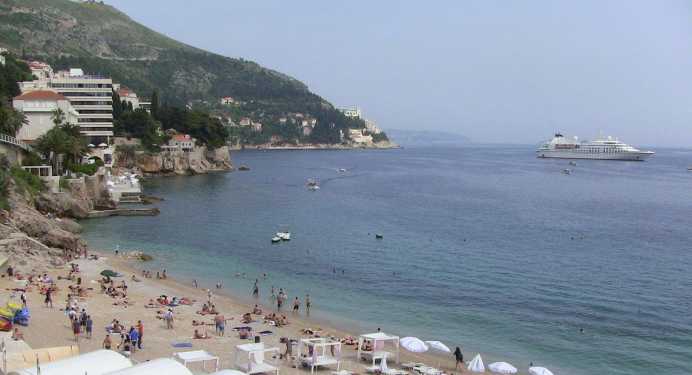
and the Croatian coast
On sunloungers
The humble sunlounger has become synonymous with the creeping development of the Croatian coastline, gradually occupying sites one enjoyed by local residents. In response, new civic initiatives are now emerging; advocating for the sustainability of Croatian tourism and striving to hold their government to account.
Visit the Croatian coast every summer and you can’t help but notice the new developments that spring up like a skin rash on a humid afternoon - hotels and apartment blocks; some exclusive, others more mundane. It is a creeping, but unrelenting process; one which impairs the daily lives of local residents.
On the sandy or stony beaches themselves, it is the seemingly banal sunlounger that is their symbolic equivalent; an equivalent whose own spread is arguably even more pernicious and unrestrained.
For the mushrooming of sunloungers constitutes a de facto claim over the very coastline in question, deterring those who have for generations enjoyed unhindered access to their preferred sunbathing spots; gathering on Sunday afternoons with friends or family, or whiling away the midweek hours during the height of summer.
Alas, even the time-honoured traditions of laying down one’s towel (itself an annoyance when subsequently abandoned for much of the day) or erecting deck chairs parallel to one another, are rendered impotent in the face of a garrison of well-marshalled sunloungers; resembling formations employed by riot police to control an unruly crowd.
Said marshalling is typically conducted by ‘security’ from adjacent hotels or resorts, whose honed presence in and off itself can stifle even the most lairy or self-righteous of tourists. Oftentimes, the deterrence is more charming and effervescent; a whiff of luxury that radiates exclusivity to all who inhale its fumes; those unaffordable cocktails that have skimped on gin or vodka, and overdone the mixer.
Though forbidden from charging for access to the beaches themselves and prevented from levying excessive rental prices for sunloungers, there are apparently cases of hotels claiming exclusivity for their guests (and, in more extreme cases, attempting to charge others for access to the coastline). Lax enforcement of regulations is a common cause of concern.
These various measures - the tangible and intangible - serve to delimit the availability of prime coastal spots; almost regardless of what time of the day one arrives (not that I am a particularly early riser). The early bird will find that the proverbial worm has been poisoned.
Beaches should remain public property - not in the sense of revenues generated for local councils, but in terms of free access for all - regardless of the constructs that increasingly bathe their shores in shadow.
Sunloungers and the behaviours they encourage are just one symptom of a host of sustainability issues facing large parts of Croatia’s almost six thousand kilometres of coastline, covering the mainland and its numerous islands; issues that are presumably more acute in neighbouring Montenegro and on the horizon for up-and-coming Albania.
It is a cause that Pokret Otoka (‘Island Movement’), for one, has embraced with noble and novel intent. 'Shout out for the islands and the coast, so they can hear us in Zagreb' ('Potrubi za otoke i obalu, nek nas čuju i u Zagrebu') is one of their protest cries. They have given voice to those who’ve long felt marginalised from decision-making processes in the country’s capital, and the lobbying efforts of hoteliers and developers.
Their comprehensive approach encompasses a host of priorities that revolve around the fundamental dilemma of how to balance mass tourism whilst protecting Croatia’s prized natural resources. The dependence of many of its member communities on tourist revenues means that innovative approaches are required in areas such as ecotourism and waste management. They can not simply afford to discourage arrivals, but must find ways to manage their number and impact.
The debate - or lack of - surrounding the recent law on concessions epitomizes concerns about the future trajectory of Croatia’s legal framework (and the process of its amendment); and the profound possibility of piecemeal privatisation of the country’s beaches. There is growing concern about the creeping claws of hotels and resorts that are eroding the liberty of Croatia’s coast and the lifestyles of those in the vicinity.
If the public continues to be prevented from expressing their views on legislation of relevance to Croatia’s maritime property, then concerned citizens will be forced to consider more direct forms of civic activism. If their voices are stifled whilst others are invited into the corridors of power, then new approaches will be required to address the balance. Sunloungers are likely to be just one symbol of the struggle, but they are one that will resonate with many.
Ian is a writer based in the Balkans. He is the author of 'Dragon's Teeth - Tales from North Kosovo' and 'Luka'. Follow Ian on Twitter @bancroftian.
Currently in: Belgrade, Serbia — @bancroftian
